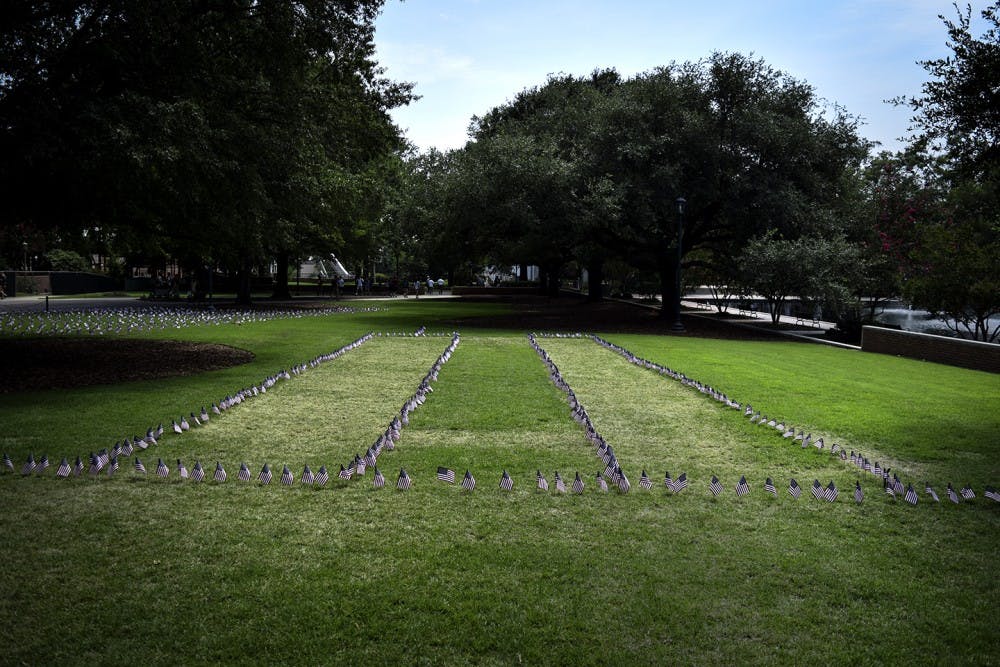It has been 15 years since the deadliest terrorist attack on American soil took place. Our generation is the one to grow up in the aftermath of terrorism. We have become accustomed to extensive security checks and protocols. Our generation will always remember, but never fully understand, what took place on Sept. 11, 2001.
Over the weekend, there were flags on display at Davis Field beside Russell House. Each flag represented an American life lost in the 9/11 terrorist attacks. Students from across campus gathered to help the Student Veterans Association place the flags for the display. Third-year social work student Ashley Bunnell was there to show her support for SVA.
"I think it's important to recognize what happened and let the people know who were affected by it," Bunnell said, recalling what things were like following the attacks. "So many family members lost people or knew someone who lost someone."
Fourth-year interdisciplinary studies student James Hull was one of the people present at SVA's event who lost someone in the attacks. Hull, who was separated from the Marine Corps for medical reasons before 2001, lost one of his friends in the Pentagon. Hull worked to re-enter the military after the attacks and succeeded in 2005. He retired from the military in 2014.
Through his efforts with SVA, Hull said he is "making sure generations and the freshmen of USC know what 9/11 stands for and remember it like we do for Pearl Harbor."
Also present during the flag setup was Cpl. Forrest Williams, first-year psychology student, who joined the Marine Corps as a result of the attacks.
"I knew I wanted to do something, but I wasn't sure at the time what it was going to be," Williams said. "A couple years later I decided I was going to join the Marine Corps."
Being 15 years removed from the devastating events, we can see just how different things became for everyone in the U.S. Fourth-year visual communications student Bridget Donovan lived in Virginia at the time of the attacks and remembers that no one knew what to do at school. Donovan was five years old and didn't fully understand how serious things were until her father wasn't home for dinner.
"He was active duty in the Navy, and he didn't come home for a month," Donovan said about her father, who worked tirelessly in the aftermath of the attacks. "He had a bed in his office and didn't come home."
Donovan's mother also worked for the Pentagon at the time. While she was not in the building when the plane hit, Donovan's mother called her children's schools to let them know that she was all right.
Lt. Col. Marc Langhor, Air Force ROTC Commander at USC, was serving in Oklahoma City when the attacks occurred. Soon after, he became an aircraft commander on an airborne radar platform and was heavily involved in surveillance missions over Washington, D.C. Langhor recalled enacting security measures he never expected to over American soil, such as flying combat missions over the District of Columbia.
"Instead of it just being, 'It's probably just an inexperienced pilot,' now the question came into your mind, 'Is this somebody we need to pay attention to?'" Langhor said about the change in mentality that occurred in and around his position.
The mentality of the U.S. as a whole changed. Sgt. 1st Class Matthew Vitug, a fourth-year criminal justice student, was a high school junior in Maryland in 2001. Some of his classmates lost parents in the attacks, and it was a difficult subject to discuss with his peers because of the close proximity to Washington, D.C. In the years that followed, Vitug decided to join the Army and was deployed to Iraq from 2007 to 2009.
"I think, looking back to it as I mature, it gives me that purpose of why I do what I do every day," Vitug said. "During deployment, it gives you that purpose. That you know that 3,000 and some change people couldn't do anything different that day."
The U.S. also witnessed a growth in Islamophobia. Those who practice the Islamic faith were treated with more suspicion by many Americans.
Not many Americans fully understand what Islam entails. Many of those who do have to learn it on their own. Donovan said she didn't have any real exposure to Islam until she entered college. Once she did have exposure to it, she said she saw more and more that there was a negative portrayal of Islam in the media, and she would like there to be a shift in the way Islam is viewed.
"Since 9/11," Donovan said, "Islamic people are only played as 'bad guys' in television and movies."
Langhor also emphasized the importance of reducing stereotypes and increasing the understanding that individuals who have an affiliation with a certain demographic do not necessarily represent everything that demographic stands for.
"We have plenty of people of Islamic faith, who are Muslims, serving alongside us," Langhor said.
All three agreed that, in order to help reduce Islamophobia, education will need to be improved. Adjunct history professor Charles Brown teaches a course on the history of the Islamic Middle East and is saddened by the increased suspicion of Muslims by American people.
"What those 19 did was criminal, it was just criminal," Brown said about the unprovoked nature of the attacks, and that while we are against terrorists like them, "that does not put us against Muslims."
On that day, the attacks changed Brown and many others' perceptions of the world. Brown said he grew up in a time when planes were just becoming prominent in the U.S. He said that they used to represent the potential of technology.
"That magic is gone for me," he said. "I look at a plane, and I'm kind of gauging what its flight plan is."
Mike Woodel contributed to reporting for this article.

